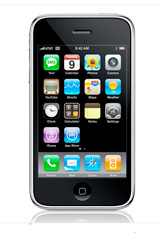My wonderful family gave me a new iPhone 3GS for Father’s Day this year. It’s an amazing device that has enough improvements in speed and new features that it feels like as big a game-changer to me as the original iPhone. I wrote a short piece for The Mac Observer that explains why I thought this was a very compelling upgrade—at least for someone who had skipped the last one. [UPDATE: The article is now available on The MacObserver. If you feel so inclined, please leave a nice comment.]
Category: Apple
Initial impressions of the iPhone 3GS
Oh. My. Goodness.
IDG moves Macworld Expo to Feb 9-13, 2010
IDG World Expo announced that it’s moving the dates for next year’s Macworld Conference & Expo from January to February 9-13. This is a great move on the part of the Macworld Staff. One of the few criticisms of the show was that it was held too close to the Holidays. The extra breathing room will benefit developers, attendees and even us lowly conference faculty.
But best of all, it will no longer coincide with my lovely wife’s birthday.
iPhone 3.0 discussed on MacJury
 The latest installment of Chuck Joiner’s MacJury podcast is up. In it, I take part in a great panel discussion with a stellar lineup of “jurors:” Macworld’s Peter Cohen, Tonya Engst of TidBITs and Take Control, John Braun of The Mac Observer, Don McAllister of Screencasts Online and Adobe’s Terry White.
The latest installment of Chuck Joiner’s MacJury podcast is up. In it, I take part in a great panel discussion with a stellar lineup of “jurors:” Macworld’s Peter Cohen, Tonya Engst of TidBITs and Take Control, John Braun of The Mac Observer, Don McAllister of Screencasts Online and Adobe’s Terry White.
It’s a lively hour’s worth of talk about what’s in the update, what’s not and a little digging into what’s important and why. Panels this large can tend to get a little unwieldy, but thanks to Chuck Joiner’s expert choreography and the terrific panelists, the result is a spirited, friendly and fun discussion.
If you don’t already subscribe to the MacJury podcast, you should. It’s a consistently relevant, interesting and entertaining look at the issues surrounding Apple and the Macintosh.
Apple’s iPhone 3.0 update: the good, the bad and the still missing
 Apple held its iPhone 3.0 event today and unveiled a slew of new features, but no real surprises. Cut and paste is finally here, Flash is still not, and Push Notifications are apparently here for real this time.
Apple held its iPhone 3.0 event today and unveiled a slew of new features, but no real surprises. Cut and paste is finally here, Flash is still not, and Push Notifications are apparently here for real this time.
Perhaps the biggest news — or at least the news with the most far-reaching consequences — is related to commerce. The iApp store will now have support for “in-App” purchases along with subscriptions. That means you can buy new furniture within The Sims, buy new books within an eReader app, or subscribe to a magazine or online financial service. The “one-and-done” method of purchasing iPhone apps could well be over. As I “semi-live-Tweeted” the event, I called iPhone 3.0 the “Monetization” update and noted that it would be interesting to see how the inevitable attempts by developers to “nickel and dime” the iApp buying process would fly in the face of the existing 99¢ per app mentality that seems to be dominating the market.
What I’m hoping for in the iPhone 3.0 software
 If you’re reading this, it should come as no surprise whatsoever that I’m eagerly anticipating tomorrow’s Apple event where they’ll describe the upcoming 3.0 update to the iPhone software.
If you’re reading this, it should come as no surprise whatsoever that I’m eagerly anticipating tomorrow’s Apple event where they’ll describe the upcoming 3.0 update to the iPhone software.
Here are a few of the things I’ll be looking for:
Jobs steps down for now as CEO; on medical leave through June
 I don’t do much breaking news these days, but word is getting out that Apple CEO Steve Jobs is taking a medical leave until the end of June and leaving COO Tim Cook in charge of day to day management of the company.
I don’t do much breaking news these days, but word is getting out that Apple CEO Steve Jobs is taking a medical leave until the end of June and leaving COO Tim Cook in charge of day to day management of the company.
According to Silicon Valley Insider, Jobs sent an internal email to Apple employees informing them of the decision:
Team,
I am sure all of you saw my letter last week sharing something very personal with the Apple community. Unfortunately, the curiosity over my personal health continues to be a distraction not only for me and my family, but everyone else at Apple as well. In addition, during the past week I have learned that my health-related issues are more complex than I originally thought.
In order to take myself out of the limelight and focus on my health, and to allow everyone at Apple to focus on delivering extraordinary products, I have decided to take a medical leave of absence until the end of June.
I have asked Tim Cook to be responsible for Apple’s day to day operations, and I know he and the rest of the executive management team will do a great job. As CEO, I plan to remain involved in major strategic decisions while I am out. Our board of directors fully supports this plan.
I look forward to seeing all of you this summer.
Steve
Trading on Apple stock was briefly suspended today on the news, and is scheduled to resume in about five minutes (in after-hours trading) as I write this. According to Yahoo, Apple is currently selling at $85.33.
This should be some ride.
(Hat tip to Shawn King for the news.)
Macworld keynote reaction on MacVoices TV
 I joined a great group of Mac pundits for a session of Chuck Joiner’s new MacVoices TV podcast. It’s a 20-minute or so round table discussion about Apple’s last Macworld keynote and Phil Schiller’s performance as a substitute for Apple CEO Steve Jobs. The panel included Bob “Dr. Mac” LeVitus, Mac author and columnist for the Houston Chronicle and The Mac Observer, Terry White of Adobe, Adam Christianson of the MacCast and of course, Host Chuck Joiner.
I joined a great group of Mac pundits for a session of Chuck Joiner’s new MacVoices TV podcast. It’s a 20-minute or so round table discussion about Apple’s last Macworld keynote and Phil Schiller’s performance as a substitute for Apple CEO Steve Jobs. The panel included Bob “Dr. Mac” LeVitus, Mac author and columnist for the Houston Chronicle and The Mac Observer, Terry White of Adobe, Adam Christianson of the MacCast and of course, Host Chuck Joiner.
I like the video format and I think Chuck Joiner’s onto something here. Video’s bound to have a different set of obstacles, especially once the panelists are no longer in the same location, but the production values so far have been pretty good and improving. While podcasts are likely to remain a commuting activity (and therefore audio-only) for me, seeing the panel is a lot more compelling than just hearing them. It will be interesting to see how the format works over Skype, but given Chuck’s track record, I’m optimistic that he’s got another hit on his hands. For the video-resistant, the show is also available in an audio-only version through the MacJury feed.
While I was out…
 I’m back from what was a very interesting Macworld, and possibly one of the best. (It was surely one of the most exhausting.) I delivered three sessions this year (well, one session delivered three times), and they seemed to be very well received. The crowds were definitely smaller than I expected — an observation I heard repeatedly at the show. But just from the timing, it seems to me that the decrease in attendance was more a result of the economy than Steve Jobs’ absence.
I’m back from what was a very interesting Macworld, and possibly one of the best. (It was surely one of the most exhausting.) I delivered three sessions this year (well, one session delivered three times), and they seemed to be very well received. The crowds were definitely smaller than I expected — an observation I heard repeatedly at the show. But just from the timing, it seems to me that the decrease in attendance was more a result of the economy than Steve Jobs’ absence.
I also wrote a column for The Mac Observer — an opinion piece on my reflections on the Phil Schiller keynote. I also took part in a MacJury/MacVoicesTV session on the same subject. I haven’t seen this posted anywhere yet, and it’s probably past the point where it’s relevant anymore. I love the idea of doing video, but if it’s going to mean this kind of delay in making it available, it’s probably better to stick with audio. Who knows — maybe I was so awful that host Chuck Joiner decided to scrap it altogether.
Finally, the band I’m in — the Macworld All-Star Band — played our 11th Macworld gig and our sixth Cirque du Mac show hosted by The Mac Observer. The party, originally meant as the successor to the Mac the Knife parties, has taken on a life and mystique of its own. This year, we had caricaturists, a superb light show by Andrew Stone — and even a trapeze artist. Attendance jumped from 500 people jammed into the Red Devil Lounge to 850 in the very stylish Broadway Studios. I think we sounded great and I know we had a blast. It’s an incredible group of very talented people who have become some of my dearest friends in the world: Paul Kent, IDG vice president and the executive in charge of Macworld; Dave Hamilton, president of Backbeat Media and The MacObserver; Christopher Breen, Mac author and senior contributing editor for Macworld magazine; Bob “Dr. Mac” LeVitus, Mac author and columnist at the Houston Chronicle; Duane Straub, former administrator at Lawrence Livermore Labs; and Bryan Chaffin, executive vice president at The Mac Observer.
It’s the end of the world as we know it (and I feel fine)
It’s amazing. Even without the benefit of iCal or blogs, the ancient Mayans managed to come within a hair’s breadth of correctly predicting the end of the world.
It came not in December of 2012 as they calculated, but a mere four years and one week earlier. Tuesday, in fact, when Apple announced that Steve Jobs would not deliver the keynote speech at the 2009 Macworld Conference and Expo, and that the conference would be Apple’s last as a participant.
Amidst the great wailing and gnashing of teeth came predictions across the Mac web that the Expo was doomed.
And maybe it is.
[ad#In-article banner]
It’s certainly the end of an era, but things like the Internet and a couple hundred retail stores will do that to a tech conference. Whereas Macworld was the biggest megaphone around a decade or so ago, Apple has made a point since it opened its first round of stores that it got “Macworlds worth” of traffic through its retail outlets — first in weeks, then in mere days. The resurgence in popularity of Apple means the company can generate keynote-like attention at will — and on its own schedule. If Apple had waited until next month’s keynote to unveil its new line of laptops, do you know how many of them it would have sold during the Holiday shopping season? That’s right: none.
Apple is not fond of giving up control of anything, but for years, it had to where the calendar was concerned. It had to wait until Expo to introduce new products (or rush them to market before they were ready) and if it didn’t, the company risked the wrath of the press and rumor-mongers who would immediately deride the event as a disappointment.
Even if the move makes sense from a business perspective (and I don’t disagree that it does), the timing couldn’t have been worse if it had been intentional — and there are those who would say it was. I agree with Daring Fireball’s John Gruber that Apple needed to make both announcements at the same time. If they had simply said Jobs wasn’t delivering the keynote with the intention of dropping the other shoe after the show, the reaction would surely be that Jobs’ health was the issue. But would it have killed Jobs to deliver one more keynote — especially at the 25th anniversary of the conference?
I think the answer to that one can be seen in the special attention — or rather lack of it — that Apple paid to the 20th anniversary of the Macintosh. During that keynote, Jobs replayed the famous “1984” Superbowl commerical in which Apple introduced the Mac. But even then, the gesture was not a look back, but a look ahead, in which the sledgehammer-slinging runner was digitally altered so she was wearing an iPod.
Maybe there was some kind of message to IDG in the announcements; maybe it was payback for some past slight, whether perceived or real. But my guess is that Apple simply works on its own schedule, for its own benefit — and if IDG or the other developers that exhibit at the show are impacted, well, that’s life.
So what happens to Macworld now? The easy example to cite is what happened to the summer show, when Apple pulled out of the Expo after IDG decided to move it from New York back to Boston. That event withered quickly then died. Is that the destiny in store for Macworld San Francisco? Certainly not if Paul Kent, the IDG executive in charge of the conference has anything to say about it.
Under Mr. Kent’s leadership, the event has grown dramatically over the past several years, both in size and quality. And while I’m sure he and his team don’t look at this as good news, I’d be very surprised if someone hasn’t already unlocked a secret drawer somewhere they hoped they’d never need to open and pulled out plans that have long been in place for just this situation.
The real shame in this is that in a perfect world, Apple’s absence shouldn’t affect the show very much at all. The conferences are just as valuable, the exhibitors just as compelling. All Apple has ever really offered to Expo attendees is the promise of new product announcements, the possibility of “just one more thing” and a place to display them, if you could work your way through the crowds. If anything, Apple’s absence gives other developers a better chance to grab some attention, if — and this is a very big, make-it-or-break-it if — IDG can convince attendees that a Macworld without Apple is still something worth coming to.
More likely, Macworld will have to morph into something else — probably something smaller, maybe even something mobile. In the long run, that may be a good thing, but it’s going to be an enormous challenge.
The good thing about an end of an era is that it usually means another one is beginning. Like it or not, Apple has ended the era of Macworld as it’s been. Now it’s up to IDG to define what Macworld will become.
[You can also now find this article on The Mac Observer website.]
